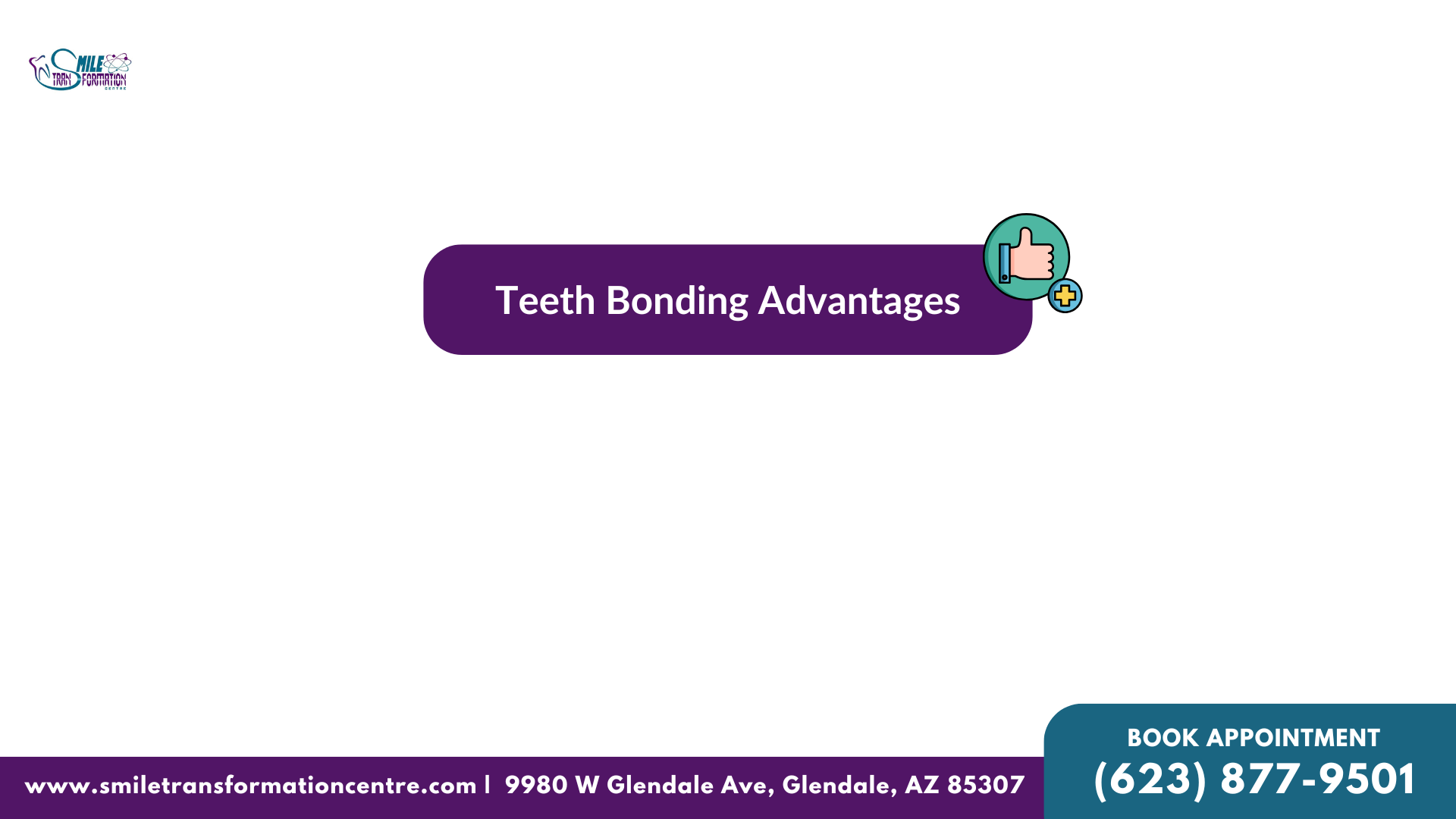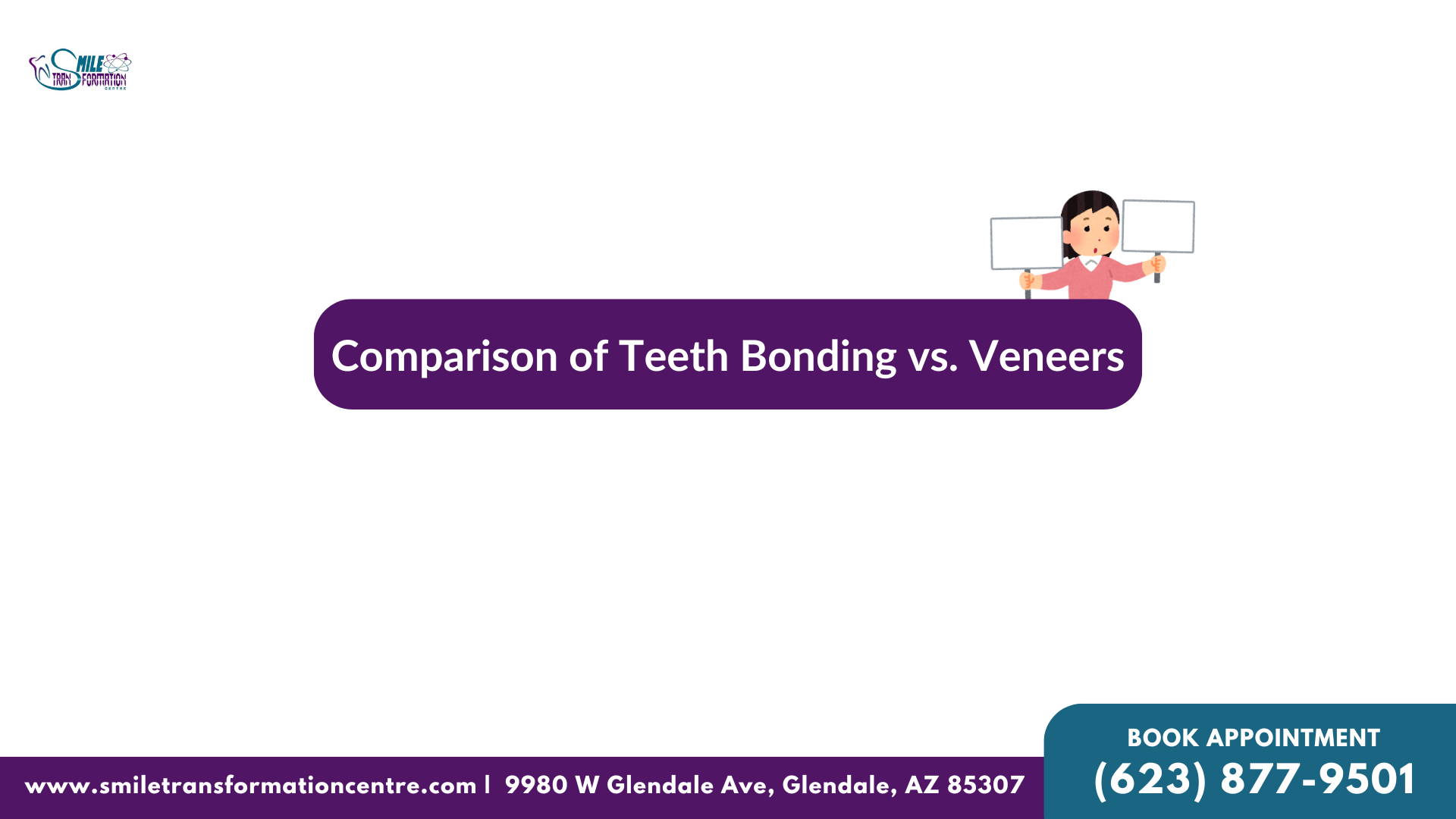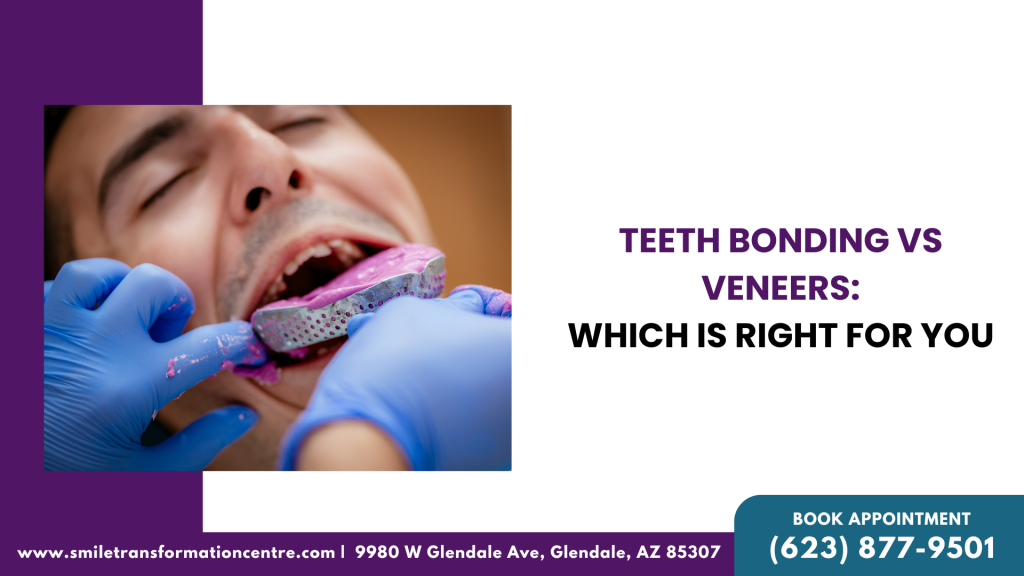Veneers and teeth bonding are two common cosmetic dentistry techniques for improving the smile. Both methods have the power to change the teeth’s look, but they differ greatly in terms of application, cost, and longevity. Dental Bonding vs Veneers. But with so much information out there, it can be confusing to know which is right for you. Don’t fret! This blog will break down the key differences between teeth bonding and veneers, helping you navigate your smile transformation journey.
Dental Bonding
Dental bonding involves applying a tooth-colored resin to the surface of your teeth. This resin is shaped and polished to match the surrounding teeth, effectively repairing chips, cracks, or gaps. Bonding is a quick, non-invasive procedure that can usually be completed in a single visit.
Veneers
Veneers are thin, precisely crafted shells that are intended to cover your teeth’s front surface. Veneers, which are glued to the teeth to enhance their color, shape, size, or length, are made of strong materials like porcelain. Usually, the procedure necessitates two to three dental appointments.

Procedure and Application
- Teeth Bonding: – The bonding process is relatively simple and involves minimal preparation. After selecting a resin color that matches your natural teeth, the dentist applies and molds the resin to the desired shape. The resin is then hardened using a special light and polished for a smooth finish.
- Veneers: – Getting Dental veneers in Glendale involves a more detailed process. The dentist will remove a small amount of enamel from the tooth surface to make room for the veneer. After taking an impression of your teeth, the custom veneers are crafted in a dental lab. Once ready, the veneers are bonded to your teeth using a strong adhesive.
Aesthetic results
Cosmetic Bonding vs Veneers: – Both options can provide excellent aesthetic results, but veneers tend to offer a more natural and long-lasting appearance. Veneers are highly resistant to staining and can correct more significant cosmetic issues. Bonding is effective for minor repairs and is less expensive, making it a good option for smaller imperfections.

Teeth Bonding Advantages
- Teeth bonding uses a tooth-colored resin that is similar to white fillings. This material blends seamlessly with the natural teeth, providing a cohesive look.
- The bonding process is quick and minimally invasive, often completed in a single visit. Typically, the procedure takes about 30-60 minutes per tooth.
- It is effective for repairing chips, cracks, gaps, and minor discoloration. Bonding can also improve the shape and size of teeth, making it a versatile cosmetic solution.
- Generally more affordable than veneers, teeth bonding costs between $100 and $400 per tooth, making it an accessible option for many patients.
- With proper care, bonding can last between 3-10 years. However, it may require occasional touch-ups due to wear and tear.
- The resin used in bonding is more prone to staining from substances like coffee, tea, or smoking, necessitating careful maintenance to avoid discoloration.
Veneer Advantages
- Veneers are made of thin shells of custom-made porcelain or ceramic, which offer a highly natural and aesthetically pleasing appearance.
- The process involves two appointments – one for preparation and one for placement. Preparation includes slight enamel removal, and placement is done using dental cement.
- Veneers are ideal for addressing major cosmetic concerns such as severe discoloration, misshapen teeth, larger gaps, and slightly crooked teeth. They provide a uniform and bright smile.
- Veneers are more expensive than bonding, ranging from $800 to $2,500 per tooth. This higher cost reflects the quality, durability, and longevity of the treatment.
- Veneers can last 10-20 years with good oral hygiene and proper care, making them a long-term investment in dental aesthetics.
- Veneers are highly stain-resistant, maintaining their color and shine over the years even with regular consumption of staining foods and beverages.
Disadvantages of Teeth Bonding
- Bonding is prone to chipping and wear over time, especially under pressure or due to habits like nail-biting or chewing on hard objects.
- The resin material is susceptible to stains from food and drink, which can affect the appearance and necessitate more frequent maintenance.
- Bonding lasts 3-10 years, requiring more frequent replacements or touch-ups compared to veneers.
- The composite resin is less strong than natural enamel, making it more prone to damage and less suitable for teeth that undergo significant stress.
Disadvantages of veneers
- Veneers are expensive, ranging from $800 to $2,500 per tooth. This can be a significant investment, especially if multiple teeth are involved.
- The process requires irreversible removal of tooth enamel, meaning the natural tooth will always need some form of restoration.
- Although durable, veneers can crack or chip under force. Repairing or replacing a damaged veneer can be costly and time-consuming.
- Achieving a perfect color match with natural teeth can be challenging if veneers are not applied to all visible teeth, making it essential to have a skilled dentist for optimal results.
Here’s the takeaway:
Both teeth bonding and veneers offer incredible cosmetic benefits, but they excel in different areas. When comparing Dental bonding vs veneers cost, bonding is a budget-friendly option for minor repairs, And when it comes to Veneers vs bonding durability, veneers provide a long-lasting solution for dramatic smile transformations.

Comparison of Teeth Bonding vs. Veneers
| Aspects | Teeth Bonding | Veneers |
|---|---|---|
| Material | Tooth-colored resin, similar to white fillings | Thin shells of custom-made porcelain or ceramic |
| Process | Quick and minimally invasive, often completed in one visit | Requires two appointments – one for preparation and one for placement |
| Uses | Repairs chips, cracks, gaps, and minor discoloration | Ideal for major cosmetic concerns like severe discoloration, misshapen teeth, or larger gaps |
| Cost | $100 to $400 per tooth | $800 to $2,500 per tooth |
| Staining | More prone to staining from coffee, tea, or smoking | Highly stain-resistant |
| Durability | Can last 3-10 years with proper care, but may require touch-ups | Lasts 10-20 years with good oral hygiene |
After all deciding between Teeth Bonding vs Veneers ultimately depends on your specific dental needs, budget, and aesthetic goals. At Smile Transformation Center Glendale, we offer both Dental Bonding in Glendale and Porcelain Veneers in Glendale to help you achieve the smile of your dreams.
Whether you seek a quick fix or a long-lasting transformation, Smile Transformation Center is here to guide you. Our Glendale dentists will assess your unique needs and craft a personalized plan to unlock your most radiant smile. Don’t settle for anything less than perfection – schedule your consultation today and let’s start building your Glendale dream smile together!

